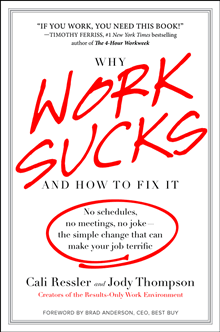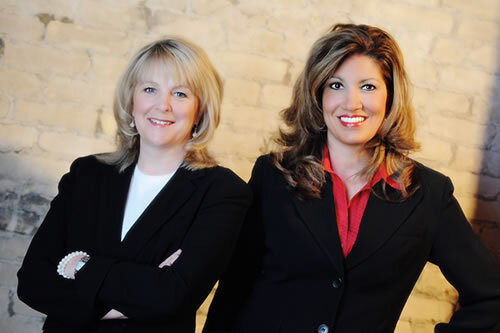Book Review: Why Work Sucks and How To Fix It
Why does work suck? For the same reason the billable hour and timesheets suck: they are all based on an incorrect belief about work.Firms are struggling with work/life balance, flextime, time management, etc. But all these are a joke. Flextime is an oxymoron if you still have a schedule or "core hours." Work/life balance is not up to firms to define, but rather their team members. Time management is, as the authors say, trying to find freedom in a prison.Knowledge workers don't need flextime or work/life balance; they need control over their time. They need to be trusted to do their work. They need to be judged on results, not putting in time.Isn't this how we all worked in college? We were responsible for our own schedules, getting our work done, studying for exams, etc. What makes firms think they need to treat knowledge workers like children after they graduate?Not only has VeraSage been preaching this message since we launched our think tank in 2001, so has a Fortune 100 company—Best Buy. Yet they have taken it a step farther with the implementation of a ROWE: Results-Only Work Environment.Cali Ressler was a 24-year-old hourly employee at Best Buy when the seeds for ROWE were planted in 2001. The program hit critical mass in 2005, and today approximately 3,000 employees work in a ROWE at Best Buy corporate headquarters in Minneapolis.Here is how Cali Ressler and Jody Thompson define a ROWE:
Each person is free to do whatever they want, whenever they want, as long as the work gets done.
Sound radical? It is. It's also the logical next step for every Trailblazer firm, or any Professional Knowledge Firm that expects to attract and inspire knowledge workers in the future.In fact, stop reading this review and go read this book. It's one of my Top Ten all time Best Business Books, ever (defined as significantly altering my beliefs and/or behavior).I had the great good fortune of seeing Cali and Jody conduct a presentation on ROWE on May 8, 2007 at an Association of National Advertisers (ANA) conference. ROWE had gotten major publicity at the end of 2006 with a cover story in Business Week. The presentation was excellent, and these two ladies are soul mates to us at VeraSage, since they are trying to effectuate the type of radical change we are.Beliefs Are More Important Than KnowledgeWe humans are best understood more for what we belief than what we know. And Cali and Jody think our beliefs about work are deeply flawed. Work is what you do, not where you go, or where you are.Yet, most firms belief in the following myth:
Results = Time + Physical Presence
Readers of VeraSage will recognize this as nothing more than a restatement of the labor theory of value.Firms believe that physical presence—what the authors call "presenteeism"—is synonymous with creating results. Yet it doesn't matter where today's knowledge workers are located. Management by walking around was invented in the days before email, cell phones, voice mail, blackberries, and intranets—24/7 connectivity and accessibility.Think about it. We only believe that time spent equals results at work. No one looks at a pile of laundry and thinks about time, we think about the result required. Why would we want work to be any different?Having to account for time makes liars out of us all—about why we were late, for example. The clock disrupts engagement, fluidity, while discouraging innovation and creativity. It puts more emphasis on efforts, activities, and inputs rather than outcomes, results, and value. It turns adults into children.You've heard it in every office where you work. The authors even have a Trademarked name for it: Sludge. You know, the snide little comments when you come in late: "Nice of you to join us." Or, "I should take up smoking so I can take more breaks"; "I should have kids so I can take off early."All of these comments have nothing to do with the results workers are creating. They simply judge others based on the belief that presenteeism is required to create results.The authors have the perfect retort to these types of comments in the early days of transitioning to a ROWE: "Is there anything you need?" That puts the focus where it should be: on the tasks to be accomplished rather than the outdated idea of having to be present from 8-5 (or during core hours, or some other such nonsense).After all, if a team member isn't performing, working longer hours is not going to make a difference.A ROWE is like Tivo for your job. You have complete control over your schedule. All meetings are optional. You decide when and where you are going to work. But you will be measured and judged on the results you produce.Consequences of a ROWEYou control the energy you commit to your job. If you are a night owl, work when you're at your best. If you're a napper, take naps. If you have a standing tee time on Wednesday afternoon, go.It forces your boss and co-workers to be more clear about expectations, outcomes, project management goals, etc., since that is the basis on which you are going to be judged. There's more up-front planning and innovation, since if you save time, it's now yours.If you work in teams, your teammates, like Survivor, will vote you off the island if you don't pull your weight. It forces everyone to question the outcome of various work, constantly asking does this add value? Why is it done this way? Could it be done better? Does it need to be done at all?The authors also point out that true slackers won't last in a ROWE.
In most departments at Best Buy, involuntary turnover rates (i.e., people getting fired for not doing their job) went up after they migrated [to a ROWE]. On the other hand, voluntary turnover rates (i.e., people leaving for a different company) plummeted.
The Illusion of ControlI can hear the old command-and-control types exclaiming this will lead to chaos. People have to be supervised; watched; monitored; measured; micromanaged, etc. This is precisely why works sucks. A ROWE is the only remedy.Workers having control of their own time is not zero-sum, meaning they gain at their employer's expense. Like all value, it's win-win. But again, it takes a change in fundamental beliefs.You can imagine the "how to" questions the authors get asked in their workshops. Here are some common questions: "How are the results going to happen? How do we know we're achieving our goals? How will we know that everyone is pulling their weight?" I love their response:
The glib answer is: How do you do that now? Because the way the game works now doesn't provide answers to these questions.
Amen. They quote Beth, a senior supervisor with a team of thirteen employees, who has been operating in a ROWE at Best Buy for three years:
The hardest thing for me as a manager about migrating to a ROWE was giving up control. I thought I had control over my people before. I thought if I could see them all in their cubes that they were working hard for me. Now that I'm in a ROWE, I realize that was all just an illusion—I really had no idea what they were doing. As managers, we're bound to this illusion. It's time to let go and really see what our employees can do.
The book has an entire Appendix dedicated to "Yeah, Buts," which I can remember hearing variations of in the restroom after their presentation: "Yeah, but that would never work in our company; that's easy for Best Buy, but we're [smaller], [larger], [sell services], [not located in Minneapolis], [insert your own excuse here], ad nauseam. Here is an example of one of their Yeah, Buts:
"This will work for some people but not everyone. Some people simply need more supervision."People don't need supervision [especially knowledge workers!]. They need a clear idea of what they need to do and a clear sense of when it needs to be done.
How many firms provide this level of expectations? Very few in our experience. Because if they did, they wouldn't need timesheets, or to micromanage their people.The authors exhort us to "Trust your people like you trust yourself":
Stop making rules for the few you're afraid won't live up to your expectations. Or rules that protect you from the incompetence of the few but hinder the performance of the many. Your goal is to make work as unlike grade school as possible.
They do point out that the Department of Labor regulations still require nonexempt employees to track time, treating them like second-class citizens. It will take a while for governmental regulations to keep pace with the knowledge economy.I do have minor quibbles with the authors: the book is incredibly redundant, but since it's short, and so radical, they can be forgiven. They also claim on page 116 that everyone is a knowledge worker, which is not the case. Knowledge workers own the means of production, and this is not the case with every worker. They claim the Labor Standards Act of 1938 eliminated child labor and established the minimum wage. But the free market, competition, productivity and wealth creation had far more to do with eliminating child labor, and paying far above the minimum wage, than did governmental laws.A Call to ArmsWe at VeraSage have long been frustrated with work/life balance, Gen X, Y, and Z differences drivel, flextime, time management, etc. They are all crap. They don't get to the root of the problem, which is that most firms are operating under the labor theory of value. Now add "presenteeism" to that theory, thanks to Cali and Jody.The antidote is establishing a ROWE.PKFs better be among the first to embrace a ROWE. If you lead a PKF, establishing a ROWE is essential for your long-term viability. This is the future. But as the authors admit:
...we have a fight on our hands, and we're asking for everyone's help. The change from a traditional work environment to a Results-Only Work Environment will come from the middle and below. As a result it will not come easily or quickly. The people have to demand a better way of working and living. No one is going to give this to us.
This is the next logical step for every Firm of the Future. It is an idea whose time is here. To treat people with the dignity, respect, and trust they deserve, rather than like bags of cement we move around at our will.There's no need for work to suck. Knowledge workers of the world unite—establish a ROWE! It's the 21st century knowledge worker's equivalent to the 19th century union.For more information about ROWE visit www.culturerx.com. To learn more about the authors and read their blog, visit www.caliandjody.com.

